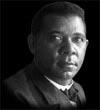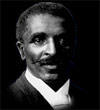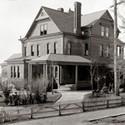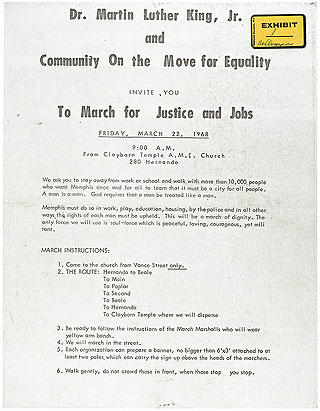LibGuides: African American History
African American History
Chronology of Freedom from the Colonial Williamsburg Foundation
- September 18, 1850
- April 8, 1864 The Fugitive Slave Act requires all states to return escaped slaves.
- May 24, 1861 Three enslaved persons escape to Fortress Monroe in Hampton, Virginia. General Benjamin F. Butler declares them “contraband of war.” African Americans flock to Fortress Monroe seeking refuge.
- August 6, 1861 The First Confiscation Act makes any property (including enslaved persons) used in support of the Confederate war effort subject to seizure and forfeiture.
- August 30, 1861 Union General John C. Frémont declares martial law in Missouri and declares the slaves of disloyal owners free.
- December 1, 1861 Secretary of War Simon Cameron’s annual report is issued without its original recommendations of emancipation and employment of former slaves in the war effort.
- March 13, 1862 Congress forbids the return of fugitive slaves by Union military forces.
- April 16, 1862 Congress bans slavery in Washington, DC, compensating slave owners, and appropriating funds for the colonization of former slaves abroad.
- May 9, 1862 Union General David Hunter declares martial law in South Carolina, Georgia, and Florida, and declares slaves free because “slavery and martial law in a free country are altogether incompatible.” President Lincoln nullifies Hunter’s declaration ten days later.
- June 19, 1862 Congress prohibits slavery in U.S. territories.
- July 14, 1862 Lincoln unsuccessfully urges Border States to plan for gradual emancipation.
- July 17, 1862 The Second Confiscation Act attempts to resolve the uncertain status of the “contrabands” by declaring them not merely seized property, but free. On the same day, the Militia Act allows African Americans to contribute to “any military or naval service for which they may be found competent.”
- September 22, 1862 President Lincoln issues his preliminary Emancipation Proclamation.
- January 1, 1863 The Emancipation Proclamation declares slaves in Confederate-controlled territory free.
- December 8, 1863 President Lincoln’s amnesty offer to Confederates who pledge allegiance to the Union includes the return of seized property, but not slaves.
- April 8, 1864 The U.S. Senate approves a constitutional amendment abolishing slavery, which ultimately becomes the 13th amendment after its ratification in December 1865.
Emancipation Proclamation - The American Civil War was fought to preserve a nation. President Lincoln believed slavery was evil, but didn't think most people would fight to free the slaves. He wanted to end slavery, but believed that the Constitution protected it. As thousands of slaves rushed to join the Union army, freeing them became a military strategy. His strategy was to seize enemy property by allowing the slaves who were compelled to help with the war effort to become contraband. Emancipation raised the stakes as the war became about freedom and transformed the South.
- Topic: Emancipation Proclamation
- Language: English
- Lexile: 1310
- Video: http://www.history.com
Changing America: The Emancipation Proclamation, 1863, and the March on Washington, 1963
Changing America: The Emancipation Proclamation, 1863, and the March on Washington, 1963 is an online exhibition that examines each historic event individually and the link that bonds them together. As you explore the many topics related to the Emancipation Proclamation such as resistance, the Civil War, and Abraham Lincoln, you will find many photographs, documents, and artifacts to examine. Similarly, you will find many primary sources available as you read about the March on Washington in celebration of the one hundredth anniversary of the Emancipation Proclamation.
- Topic: Emancipation Proclamation
- Language: English
- Lexile: 960
- Primary Source Material: http://americanhistory.si.edu
The Library of Congress
- Africans in America from the National Endowment for the Humanities
In the tradition of W.E.B. Du Bois, Henry Louis Gates Jr. explores the history of a people.
- National Gallery of Art: Collection Highlights African American Artists American Visionaries
Includes nearly 400 works by African-American artists. Includes information about Robert Seldon Duncanson, American, 1921 - 1872, Still Life with Fruit and Nuts, 1848, oil on board, Gift of Ann and Mark Kington/The Kington Foundation and the Avalon Fund, 2011.98.1
Key in African American in the sites below. Each site offers primary source material including images, videos, art work, speeches, laws and more.
"Who are the Legends of Tuskegee and what do they have in common? Booker Taliafero Washington, George Washington Carver and the Tuskegee Airmen all came to Tuskegee and created their own legends. Tuskegee is more than a town located in Macon County, Alabama. It is an idea and an ideal. It was a bold experiment and a site of major African-American achievements for over 100 years."
- Tuskegee Airmen
- Tuskegee Institute
"In 1881, Booker T. Washington arrived in Alabama and started building Tuskegee Institute both in reputation and literally brick by brick. He recruited the best and the brightest to come and teach here including George Washington Carver who arrived in 1896. ..." The Tuskegee Institute is now Tuskegee University.
Infoplease - Black History Month Special
- Biographies and Special Features
http://www.infoplease.com/black-history-month/special-features.html
- Booker T. Washington
500 Notable African American Biographies
- A-Z List
- Civil Rights Leaders
- Figures in Abolitionism
- Government Officials
- Religious Leaders
- Scholars & Educators
- Scientists & Inventors
- Actors
- Literary Figures
- Musicians
- Visual & Performing Artists
- Baseball Players
- Basketball Players
- Boxers
- Football Players
- Track and Field Athletes
- Other Athletes
- http://www.infoplease.com/black-history-month/special-features.html
- Famous African American Scientists & Inventors
http://www.infoplease.com/african-american/trailblazers.html - Against Slavery
- Legacy of Jim Crow
Protests
Sanitation Workers Strike
“…The Memphis Sanitation Workers' strike began on February 11, 1968, following years of dangerous working conditions, discrimination, and the work-related deaths of two African American sanitation workers. Led by local clergy, community members engaged in boycotts, mass meetings, marches, and other civil disobedience in support of the strike. The strike ended April 12, 1968.”
The Archive
The words of the late Dr. Martin Luther King, Jr. resound through history as some of the most inspiring and influential words ever spoken. On January 16, 2012, on the United States’ official observance of the birthday of this visionary man, hundreds of thousands of documents which have been digitized were made public on The King Center’s web site. Simply choose a theme to get your exploration started. Primary sources such as hand-written notes and typewritten letters help history come alive. Please note the creators of the site warn that some images may be “disturbing or offensive” to some users. http://www.thekingcenter.org
link from The King Center Sanitation Workers Strike Primary source material from 1968.
Martin Luther King Jr. (1929-1968)
The most prominent leader of the civil rights movement, Martin Luther King, Jr. was named after a German reformer. Although he thought about studying medicine or law, he focused on sociology and became a Baptist minister. King reluctantly agreed to allow protestors to use his church to plan a bus boycott, but eventually took a leadership role in abolishing segregation on buses. King drew unwanted attention from segregationists, the police, and the FBI, but continued to direct nonviolent demonstrations, while creating a point of conflict that would facilitate change.
URL:
"Herein lies the great social wrong which has turned the beautiful roses of freedom into thorns to prick the hands of the black men of the South; which made slavery a blessing, paradoxical as it may appear, and freedom a curse. It is this great wrong which has crowded the cities of the South with an ignorant pauper population, making desolate fields that once bloomed "as fair as a garden of the Lord," where now the towering oak and pine-tree flourish, instead of the corn and cotton which gladdened the heart and filled the purse. It was this gigantic iniquity which created that arrogant class who have exhausted the catalogue of violence to obtain power and the lexicon of sophistry for arguments to extenuate the exceeding heinousness of crime. How could it be otherwise? To tell a man he is free when he has neither money nor the opportunity to make it, is simply to mock him..."
- Memphis, Tennessee, Sanitation Workers Strike, 1968
from the Global Nonviolent Action Database a comprehensive study of the causes and actions.
- The Two Nations of Black America: Interview With Angela Davis
Read the transcript of a PBS Frontline interview with Professor Angela Davis of the University of California, Santa Cruz. You will discover her analysis of the results of the 1960s Civil Rights Movement. The interview focuses on the idea of the emancipation of black people as a quest for economic liberation and how that quest is different today. Davis, an activist on social and human rights issues, states her opinions on the creation of the black middle class and how this group lacks political connection to the increasing numbers of black people who are more impoverished than ever before.
- Memphis Strikers Stand Firm (March 1968) Union Recognition Still Stands As Principal Issue
From Our Union » History » AFSCME and Dr. King
http://www.afscme.org/union/history/mlk/memphis-strikers-stand-firm-march-1968
From the Public Employee, March 1968. An excellent article that will make you feel you are there. Photograph of [caption] J.P. Ciampa, AFSCME International Field Staff Director, maced while supporting striking sanitation workers.
- At the River I Stand
http://newsreel.org/video/AT-THE-RIVER-I-STAND
"At the River I Stand skillfully reconstructs the two eventful months that transformed a strike by Memphis sanitation worker into a national conflagration, and disentangles the complex historical forces that came together with the inevitability of tragedy at the death of Dr. Martin Luther King, Jr.
This 58-minute documentary brings into sharp relief issues that have only become more urgent in the intervening years: the connection between economic and civil rights, debates over strategies for change, the demand for full inclusion of African Americans in American life and the fight for dignity for public employees and all working people."
- National Archives
http://www.archives.gov/education/index.html
Outstanding collection of primary source material.
- Memphis Directions GIFs - Documents via National Archives
http://civilrightsmovement.com/
- National Civil Rights Museum at the Lorraine Motel Memphis, Tennessee
http://www.civilrightsmuseum.org/
You will want to visit this site both on the web and in person.
Date: Monday, May 02, 2011, 4:17 am
By: Erica Taylor, The Tom Joyner Morning Show
During the civil rights era, black sanitation workers of Memphis made salaries that were so low, they qualified for welfare.
Last week, U.S. Secretary of Labor Hilda Solis inducted the 1,300 workers who took part in the historic 1968 Memphis sanitation strike into the Labor Hall of Fame. The workers were part of the final protest of Martin Luther King, Jr. before his assassination. Eight surviving workers were at the White House to accept the honor.
During the civil rights era, black sanitation workers of Memphis made salaries that were so low, they qualified for welfare. After issuing major complaints to the city, some of the workers held strikes. During this time, it was said that 10,000 piles of garbage had piled up throughout the city.
Pushing beyond the fear of white reaction to a union strike, the 1,300 employees staged a boycott of major businesses. The passion of the workers as they marched in downtown Memphis was visually captured in the famous Ernest Withers photo of the protesters holding signs that read, "I am a man."
The union workers were issued ultimatums by the mayor to return to work. When that failed, the men held strikes only to be attacked by police in the streets.
The plight of the Memphis sanitation workers resulted in over 30 members being held in contempt of court, threats, vandalism and bogus arrests. It soon became time to call Dr. King for his help.
Their first march, on March 28th, 1968, was broken up with violence and resulted in the shooting death of 16 year-old Larry Payne. Days later, Dr. King returned and led a peaceful march before delivering his speech, "I’ve Been to the Mountaintop." He was assassinated the following day, on April 4, and the sanitation union's requests were finally met by the mayor 12 days later.
In 1993, David Appleby, Allison Graham and Steven Ross released the documentary “At the River I Stand,” winner of the 1994 Erik Barnouw Award for Best Documentary from the Organization of American Historians. The 58-minute documentary chronicles the two-month struggle of the Memphis sanitation workers through video interviews and primary accounts of the civil rights struggle in Memphis. For more information, please click this link.
- from Blackamericaweb.com
http://www.blackamericaweb.com/?q=content/little-known-black-history-fact-sanitation-strike-1968
- Civil Rights Digital Library, Documenting America’s Strugglewith Racial Equality
Provides background information and links to other sources, ex. 1968 Sanitation Workers Strike, University of Memphis. Special Collections Department provides numerous photographs. Also provides Study Guides and Teacher Resources.
- I’ve Been to the Mountain Top
http://www.thekingcenter.org/archive/document/ive-been-mountaintop#
Primary source material.
Remembering MLK's Prophetic 'Mountaintop' Speech
On April 3, 1968, the Rev. Martin Luther King Jr. delivered his final public speech. In a crowded church in Memphis, Tenn., King spoke of the injustice felt by the city's sanitation workers, who were on strike protesting low pay and poor working conditions.
But, speaking hours before his assassination, the civil rights leader went beyond that subject, touching on death and his own mortality.
"There had been so many death threats against his life, especially since he had come out against the war in Vietnam," says the Rev. Samuel Billy Kyles, who was listening to King just a few feet away. "But he talked about death more that night than we'd heard him talk about it in a long while."
an excerpt from NPR http://www.npr.org/templates/story/story.php?storyId=89326670
Martin Luther King, Jr. and the Global Freedom Struggle Sanitation Workers Strike
http://mlkkpp01.stanford.edu/index.php/encyclopedia/encyclopedia/enc_memphis_sanitation_workers_strike_1968/
Excellent website includes extensive background information and links to leaders, places, associations - relevant to MLK, Jr.’s role in Memphis.
[Defendants'] Exhibit 1 City of Memphis v. Martin Luther King, Jr., [et al.] 1968
[Defendants'] Exhibit 1, City of Memphis v. Martin Luther King, Jr., [et al.], 1968; Records of the United States District Court, Western District of Tennessee, Western (Memphis) Division, Record Group 21; National Archives and Records Administration
- EResources
- Ebooks
- Contests and Opportunities
- Faculty Resources
- Library Good Reads
- GradPoint (opens in new window)
- LibGuides
- NHS Library Seminars (opens in new window)
-
Historical Links
- Immigrant Groups in the West
- Immigrant Groups in the West Making the Connections
- Immigration Symbols
- Immigration West
- Industrial Revolution Resources List
- Industrialists
- Korean War
- Legacy of Jim Crow
- The 60's
- Women and the Industrial Revolution
- Working Women and the Industrial Revolution
- Working Women During the Industrial Revolution
- Against Slavery
- Immigration
- Louis Braille An Exceptional Man
- MLA and APA Style Guides
- Norwood High School Home
- Quick reference
- Research & Instruction
- Summer Work
- Textbooks
This site provides information using PDF, visit this link to download the Adobe Acrobat Reader DC software.





